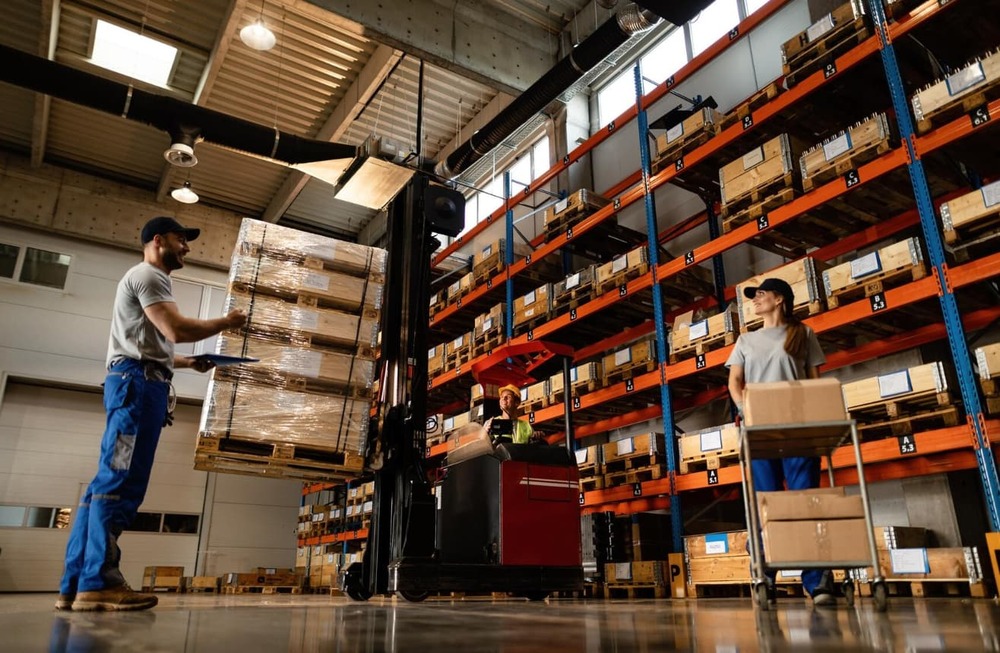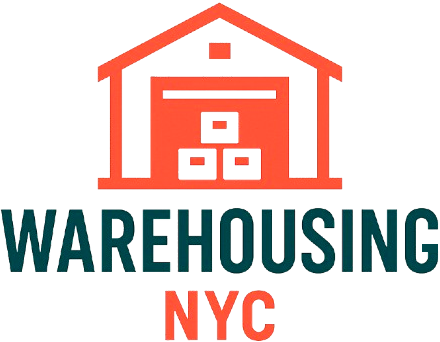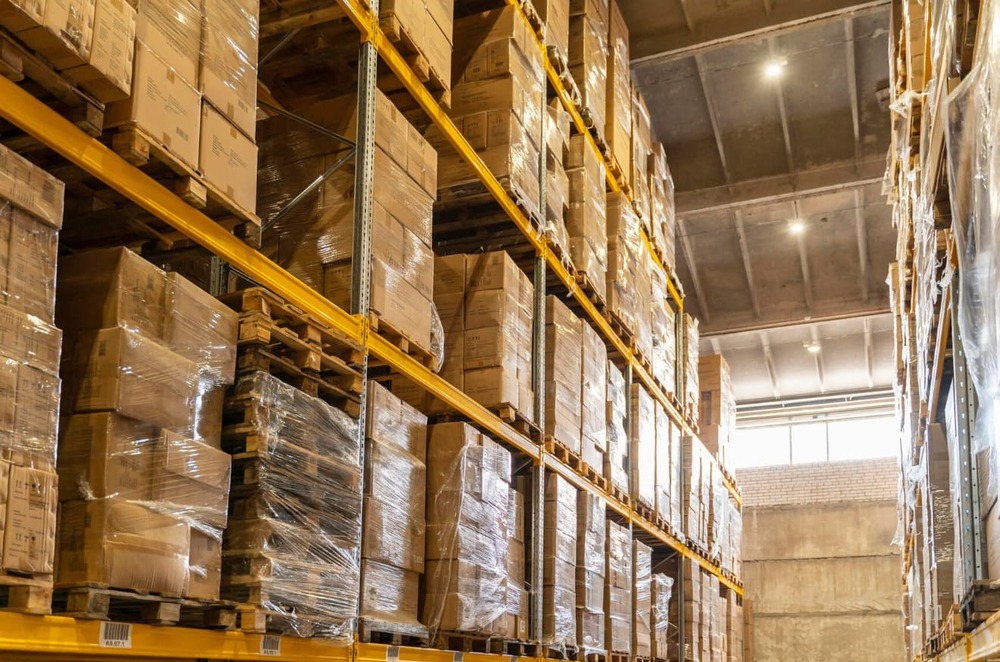As e-commerce keeps growing, so does the need for better storage solutions. Back in 2020, there were around 151,000 warehouses worldwide—and about 25,500 of those were in North America. That number is expected to climb to nearly 180,000 this 2025. With more goods moving and demand rising, having the right warehouse setup can make a big difference in how smoothly inventory is handled.
Here are a few important things to look at when picking the right storage warehouse.
Table of Contents
Key Takeaways
✔ Understanding the type, volume, and handling needs of inventory helps determine what kind of storage setup is required.
✔ Choosing a warehouse in the right location can reduce delivery times and cut transportation costs.
✔ The right facility should offer enough space, proper equipment, and tech systems that support smooth operations.
✔ A clear look at pricing and contract flexibility helps avoid hidden costs and supports long-term planning.
✔ A provider with a solid track record and reliable support is more likely to keep inventory secure and operations running.
✔ Comparing options, visiting sites, and aligning services with future goals ensures the best long-term fit
Guide to Selecting the Best Storage Warehouse for You
1. Assessing Inventory Needs
Understanding inventory requirements is the first step in selecting the right storage warehouse. A proper assessment ensures the facility can meet daily operational demands while supporting long-term growth.

Volume and Type of Products
Different types and quantities of products need specific handling and space. The warehouse must align with these requirements.
- Product Categories: Identify if items are perishable, fragile, bulky, or standard consumer goods. Each category requires different handling procedures, which can influence the layout of a commercial storage warehouse.
- Storage Density: Consider how tightly products can be packed without damaging them. A high-density configuration works best for standardized goods, while irregular shapes often need more flexible setups in a storage warehouse.
- Packaging Method: Products stored in pallets, bins, or loose cartons require varied shelving solutions. A facility offering tailored storage warehouse services can optimize space based on how goods are packed.
2. Location Considerations
Selecting the right location is one of the most important factors when choosing a storage warehouse. It directly affects how efficiently inventory is moved, received, and shipped. The right location can reduce costs, shorten delivery times, and improve customer satisfaction.
Proximity to Key Business Points
A well-located facility supports smoother operations by reducing transportation time and expenses.
- Near Suppliers: When a storage warehouse is close to suppliers, restocking is faster and more cost-effective. This reduces the risk of stockouts and supports smoother production schedules in commercial operations.
- Close to Customers: Being near end customers allows for quicker deliveries and improved service reliability. This is especially important for businesses using local storage warehouses to fulfill last-mile deliveries efficiently.
- Along Major Distribution Routes: Access to highways, ports, or intermodal hubs helps shipments move more easily and predictably. It also reduces delays for industrial storage warehouse operations handling high-volume freight.
Access to Infrastructure and Transportation
A strong local network of transportation options and public services can increase reliability and flexibility.
- Road Access: Facilities with good road access allow large vehicles to load and unload without delays or restrictions. This makes daily operations more efficient for storage warehouse services that involve regular truck movement.
- Public Transit Availability: Easy access to public transit helps employees get to work reliably and on time. This can support labor retention and stability, especially for local storage warehouses with high staffing needs.
- Utility Support: Reliable electricity, internet, and water supply are essential for keeping automated systems and equipment running smoothly. Many commercial storage warehouse facilities depend on these services for climate control and inventory tracking.
- Emergency Services: Being near fire departments, hospitals, and law enforcement can reduce risk and improve safety standards. This is especially beneficial for industrial storage warehouse locations handling sensitive or flammable inventory.
Local Regulations and Zoning Compliance
Understanding regional policies and legal limitations is essential before committing to a facility.
- Zoning Laws: Not all locations are zoned for warehouse use, especially in areas near residential or retail spaces. Businesses must ensure their chosen commercial storage warehouse location complies with local land-use policies.
- Permit Requirements: Certain goods may require handling permits, especially hazardous or temperature-sensitive items. Choosing a storage warehouse that already meets these conditions can prevent operational delays.
- Environmental Rules: Local regulations may restrict certain storage practices, especially in areas with strict environmental controls. Industrial storage warehouse operations must take care to comply with disposal, containment, and emission rules.
3. Facility Features and Capabilities
A storage warehouse should do more than just hold products—it should actively support efficient inventory handling.
Storage Capacity and Layout Flexibility
Every inventory setup is different, so flexibility in layout and available space is crucial for long-term adaptability. A well-designed storage warehouse should provide scalable racking options to accommodate growth and varied product types.
- Adjustable Racking Systems: Racks that can be resized or relocated make it easier to store goods of all shapes and sizes as business needs evolve. Flexible racking solutions are especially practical in an industrial storage warehouse setting, where inventory dimensions can vary.
- High Ceilings And Vertical Space: Warehouses with higher ceilings can support multi-level racking systems, increasing usable space without expanding the building footprint. Utilizing vertical space is an efficient strategy for businesses managing high inventory volume in a commercial storage warehouse.
- Zoned Storage Areas: Designated areas for different categories—such as perishables, oversized goods, or fast-moving items—help organize stock and reduce picking time. Organizing zones improves traffic flow and efficiency across local storage warehouses.
Technology Integration
Technology helps a storage warehouse operate smoothly by improving accuracy, speed, and inventory visibility. Storage warehouse services that include digital systems offer better decision-making and fewer manual errors.
- Inventory Management Software (IMS): IMS tracks quantities in real time, helping businesses avoid overstock or stockouts. This type of software enhances accuracy and saves time during audits, making it essential in a commercial storage warehouse.
- Barcode And RFID Systems: These systems improve the speed and accuracy of receiving, storing, and picking goods. Many local storage warehouses use RFID tags to provide affordable yet effective tracking capabilities.
- Warehouse Automation: Conveyor belts, robotic arms, and autonomous vehicles handle repetitive tasks with minimal human involvement. Automation boosts productivity significantly, especially in large-scale industrial storage warehouse operations.
Security Measures and Climate Control
Protecting inventory is just as important as storing it. A high-quality storage warehouse should provide robust safeguards and some products may also require specific environments or compliance with safety regulations.
- 24/7 Surveillance And Access Control: Security systems with real-time video monitoring and restricted access points help prevent theft and unauthorized entry. Advanced security infrastructure is a key feature of most commercial storage warehouse facilities.
- Fire Suppression Systems: Integrated sprinkler systems and smoke detectors reduce the risk of fire damage and ensure safety compliance. Facilities offering storage warehouse services often include these protections to meet industry standards.
- Clean Room or Sterile Conditions: Medical and tech products may require dust-free or sterile environments. Specialized storage warehouse services offer clean zones that comply with industry hygiene standards.
- Climate-Controlled Zones: Temperature and humidity control help protect sensitive items like electronics, food, and pharmaceuticals from damage. For example, devices with lithium-ion batteries—like cellphones—can lose performance in environments above 95°F (35°C), making climate-controlled local storage warehouses a smart choice for businesses handling delicate products.
- Pest Control Measures: Preventative inspections and ongoing pest management protect products from contamination or infestation. These routines are essential in any industrial storage warehouse that deals with bulk food, textiles, or paper goods.
4. Cost and Contract Terms
Selecting a storage warehouse requires a clear understanding of not just space and location, but also how the cost structure and contract terms impact overall inventory efficiency. Businesses should look at both direct expenses and long-term flexibility when comparing providers.
Upfront and Recurring Costs
Initial and monthly costs vary based on location, type of facility, and included storage warehouse services. Understanding these costs helps businesses avoid surprises and budget more effectively.
- Initial Setup Costs: These often include administrative fees, deposits, or charges for modifying the space to meet specific needs. Some commercial storage warehouse providers may also charge for access setup or onboarding support.
- Monthly Rental Fees: Rental pricing is usually based on square footage and facility type, such as climate-controlled or standard units. Rates for industrial storage warehouses may be higher due to specialized infrastructure or equipment.
- Operational Costs: These may cover utilities, pallet handling, or on-site labor provided by the warehouse. Businesses using local storage warehouses should check for any recurring charges tied to maintenance or handling services.
Scalability and Flexibility of Agreements
Flexible contracts allow businesses to expand or adjust their storage as their needs change. This is especially useful for companies experiencing seasonal demand or gradual growth.
- Flexible Lease Terms: Month-to-month or short-term leases let companies adapt quickly without committing to long contracts. Many local storage warehouses offer these terms to accommodate small businesses and startups.
- Expandable Space Options: Some warehouses provide scalable units that can grow alongside the business. This makes a storage warehouse a practical solution for companies with evolving inventory levels.
- Service Adjustments: Businesses may need to add or remove services like inventory reporting or extended hours. A flexible storage warehouse service agreement should allow these changes without major renegotiations.
Hidden Fees and Service Inclusions
Unexpected charges can impact profitability if they aren’t identified before signing a contract. A detailed review of inclusions helps ensure all required services are covered.
- Overage Charges: Exceeding the agreed space or weight limit may result in additional fees. This is common in industrial storage warehouses that handle bulk inventory.
- Access Fees: Some facilities charge extra for after-hours access or frequent visits. Businesses using commercial storage warehouse services should check for any time-based restrictions.
- Limited Service Bundling: Essential services like pest control, inventory software, or loading dock use may not be included in the base price. A well-outlined storage warehouse plan should clarify what’s standard and what’s extra.
- Insurance Requirements: Facilities may require third-party insurance or offer in-house coverage at a fee. This policy is typical in both large-scale and local storage warehouses to protect against liability.
5. Provider Reputation and Support
Choosing a dependable storage warehouse provider plays a major role in inventory accuracy, order fulfillment speed, and overall supply chain success. A provider’s reputation and level of support are key indicators of how well they can handle a business’s storage and operational needs.
Reliability and Track Record
A provider’s operational history often speaks volumes about their ability to manage storage efficiently and meet business expectations
- Established Experience: Providers with many years in the industry often have refined processes for handling a wide range of inventory types. A long history in offering commercial storage warehouse services usually reflects a strong foundation of trust and performance.
- Operational Consistency: A consistent record of timely deliveries, minimal damage, and organized logistics reflects dependable operations. This track record is especially important when selecting an industrial storage warehouse where large-scale inventory must be managed efficiently.
- Client Retention: Companies that keep long-term relationships with clients demonstrate reliability and customer satisfaction. High retention rates are often seen in providers offering tailored storage warehouse services that meet ongoing business demands.
Customer Service and Support Availability
Responsive and accessible customer support ensures issues are resolved quickly and operations continue smoothly.
- Dedicated Support Teams: Access to a knowledgeable and dedicated support team ensures quick problem-solving when warehouse-related issues arise. This kind of service is often a standard offering in well-managed commercial storage warehouse operations.
- Flexible Communication Channels: Providers that offer multiple ways to connect—such as live chat, phone support, and email—make it easier to address urgent concerns. Flexible communication is particularly helpful when working with local storage warehouses that may offer more immediate, hands-on support.
- Response Time: Fast and dependable response times reduce operational disruptions and prevent costly delays. Providers who specialize in storage warehouse services should prioritize quick resolutions to maintain supply chain flow.
References or Reviews From Similar Businesses
Past client experiences can reveal a provider’s ability to deliver dependable service and adapt to specific business needs. Checking references and reviews helps in making a more informed choice.
- Industry-Specific Reviews: Feedback from businesses in similar industries helps verify whether a provider can handle specific storage challenges. For instance, a commercial storage warehouse that receives strong reviews from retailers may also be well-suited for e-commerce fulfillment.
- Online Ratings and Feedback: Verified customer reviews on trusted websites highlight real-world experiences and potential red flags. A highly rated industrial storage warehouse is likely to have a reputation for handling large inventories efficiently.
- Case Studies or Client Stories: Detailed examples of past client successes showcase how the provider supports inventory growth, adapts to volume changes, or solves problems.
6. Final Evaluation And Selection
Choosing the right storage warehouse is not just about availability. It requires a close evaluation of the shortlisted options to ensure the selected facility supports both current needs and future growth.

Compare Shortlisted Options
Each potential commercial storage warehouse should be examined against clear business criteria to ensure it can handle operational demands efficiently.
- Operational Compatibility: Evaluate if the warehouse’s processes and equipment match the inventory handling needs. This includes storage methods, pallet racking systems, and loading dock capabilities.
- Technology Support: Look into whether the facility offers integrated inventory systems or warehouse management software to help track stock levels in real time.
- Flexibility and Scalability: Consider if the warehouse can scale as the business grows or adapt during seasonal changes in demand.
- Compliance and Certifications: Check for necessary industry standards, such as fire safety, cleanliness, and regulated material storage, especially when working with an industrial storage warehouse.
Conduct Site Visits and Assess In Person if Possible
Visiting shortlisted local storage warehouses can reveal practical insights that digital research cannot provide.
- Cleanliness and Organization: A well-maintained facility indicates strong management and helps preserve product quality.
- Employee Practices: Observe how staff handle goods and whether safety protocols are in place. Proper training and attention to detail reflect good service standards.
- Accessibility and Traffic Flow: Ensure there is enough space for trucks, forklifts, and employee movement. Inefficient layouts can slow operations and increase handling errors.
- Security Measures: Look for camera systems, controlled entry points, and clear visitor management practices. These are essential for protecting goods stored in a commercial storage warehouse.
Match Warehouse Capabilities with Long-Term Business Goals
Choosing a storage warehouse service that aligns with long-term strategies allows a business to operate smoothly and plan future expansions confidently.
- Strategic Location Benefits: Warehouses situated near major transport routes or customer hubs help reduce shipping time and logistics costs. This is especially important for companies that rely on local storage warehouses.
- Support for Specialized Needs: Businesses with unique inventory needs should consider warehouses that offer temperature control, hazardous material handling, or bulk storage found in many industrial storage warehouses.
- Contract Terms and Growth Flexibility: Long-term contracts should offer flexible terms to accommodate market changes, business growth, or restructuring.
Frequently Asked Questions
What is the difference between a warehouse and a storage facility?
A warehouse is a large commercial building designed for storing goods in bulk, often used for distribution and inventory management. A storage facility is generally smaller and intended for personal or short-term use. Warehouses are equipped for logistics and handling operations, while storage facilities focus on accessibility and individual unit security.
What is the advantage of warehouse storage?
Warehouse storage provides organized, secure, and scalable space for large volumes of goods. It supports efficient inventory management and order fulfillment. Warehouses often include handling equipment, climate control, and technology systems to streamline operations. This helps reduce delays and protect goods during storage.
What are the three main types of storage facilities?
The three main types are self-storage units, climate-controlled storage, and warehouse storage. Self-storage is for personal or small business use. Climate-controlled storage protects sensitive items from temperature or humidity damage.
What can be stored in a warehouse?
Warehouses can store raw materials, finished products, equipment, machinery, and inventory. Some are designed to handle specialized goods like perishable items or hazardous materials. The type of warehouse used depends on the nature and volume of the goods. Industrial, retail, and distribution sectors all use warehouses.
How do you store items in a warehouse?
Items are stored using shelving, pallets, racks, or bins based on size and handling needs. Warehouses organize goods for easy access, safety, and space efficiency. Inventory is tracked with barcodes or warehouse management systems. Proper labeling and layout help prevent damage and support fast retrieval.

Choose Reliable Inventory Storage Backed by Local Expertise!
In New York, NY, Warehousing NYC By Best delivers trusted solutions for commercial and industrial storage. With tailored storage warehouse services and reliable support, inventory stays secure, organized, and accessible. From large-scale warehouses to flexible local storage warehouses, businesses across New York, NY, benefit from strategic locations and expert handling.
Partner with a provider rooted in New York, NY. Reach out today!

